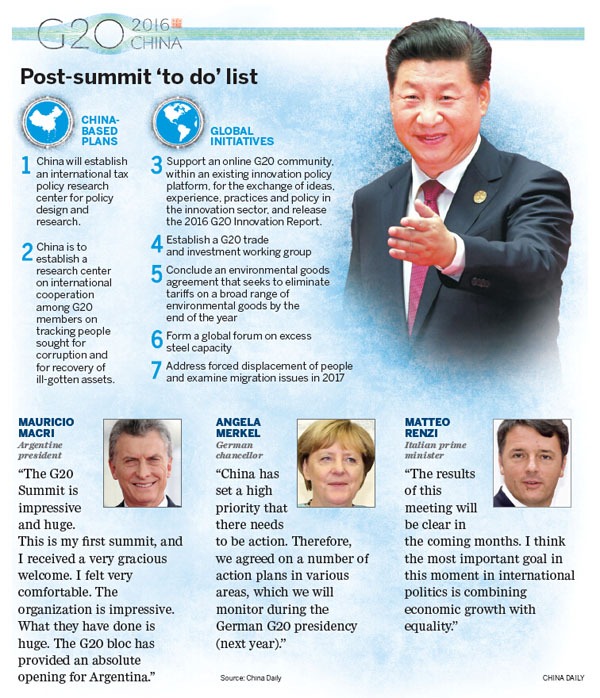Next step: Global action on growth

The G20 Leaders Summit in Hangzhou has injected fresh spirit into the effort to address the challenges of the global economy, and the next task for the leaders is to ensure the implementation of the Hangzhou consensus, economic leaders and experts said.
The summit, which concluded on Monday, released a statement in which the leaders agreed on a series of action plans to implement their growth strategies covering a wide range of policy areas.
In the statement, the leaders pledged to work together to pursue innovation-driven growth, to improve productivity, trade and investment, and to reduce overcapacity in the steel sector, which it says is a global problem requiring an effort by all.
The leaders also promised to unleash growth potential by supporting a digital economy, enhancing structural reforms, improving the resilience of the global financial system and promoting inclusive growth on the basis of mutual benefit.
Christine Lagarde, the managing director of the International Monetary Fund, urged the leaders to deliver actions, saying that President Xi Jinping's remarks that action matters more than declaration served as an inspiration at the summit.
"We met against the backdrop of a global landscape characterized by major economic and technological shifts, and by growth that has been too low for too long and which has benefited too few," the IMF chief said.
"The conclusions should not only be thought about but also be implemented," Lagarde said, adding that the Hangzhou consensus showed the G20 leaders' determination to address the challenges they face with forceful policy actions.
Angel Gurria, secretary-general of the Organization for Economic Cooperation and Development, said China should be congratulated for placing innovation at the heart of the G20 presidency.
"It is important to not just repair the problems of the past but to lay the foundations for future growth — growth that will to a large extent be driven by new ideas and technologies," he said.
While the 2014 G20 commitment set the goal of raising global GDP by an additional 2 percent by 2018, Gurria said that measures implemented so far will only add around 1 percent.
"We are only halfway there," he said, calling for full implementation of the G20 countries' growth commitments.
During the summit, President Xi also called for transformation of the G20 from a mechanism of crisis response to one of long-term governance. Analysts said Xi's proposals revealed China's growing contribution to and influence on global economic governance.
Jia Jinjing, a researcher with the Chongyang Institute for Financial Studies of Renmin University of China, said the summit reflects a change of China's role in global governance from a participator to a lead reformer.
"China has brought many new inputs to global governance, such as promoting innovation, structural reform and strengthening development and cooperation among the developed and developing countries, which breaks new ground for achieving global development goals," Jia said.
David He, a partner of Boston Consulting Group, said Xi's speech at the Hangzhou summit underscored China's responsibilities in the global economy.
"President Xi has proposed innovation, openness, connectedness and inclusiveness as the key words for global economy, hoping this Chinese wisdom could also benefit the world," he said.
"In addition, I was most impressed by his determination to deepen supply-side structural reform, to better coordinate between market and government, and to truly foster innovation," he added.








Go to Forum >>0 Comments